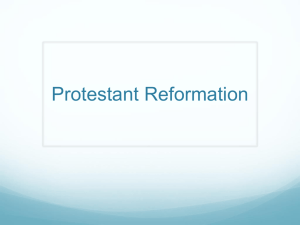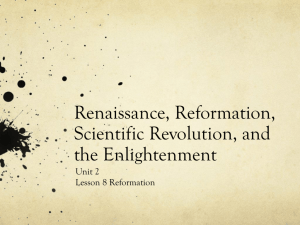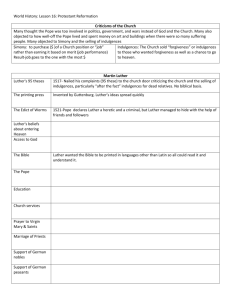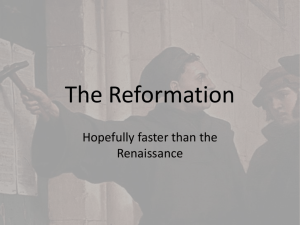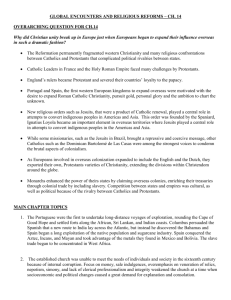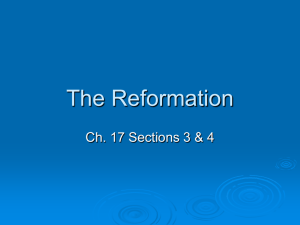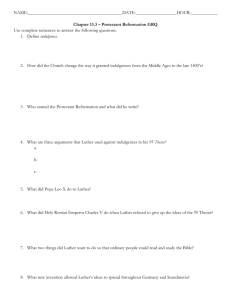Preconditions for the Reformation
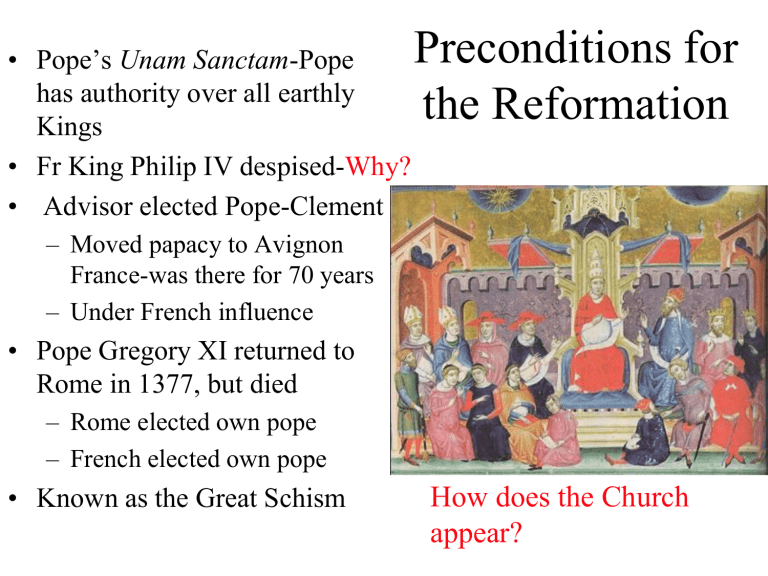
• Pope’s Unam Sanctam -Pope has authority over all earthly
Kings
• Fr King Philip IV despisedWhy?
Preconditions for the Reformation
• Advisor elected Pope-Clement V
– Moved papacy to Avignon
France-was there for 70 years
– Under French influence
• Pope Gregory XI returned to
Rome in 1377, but died
– Rome elected own pope
– French elected own pope
• Known as the Great Schism How does the Church appear?
John Wycliffe
& Jan Hus
• Wycliffe-Scholar at Oxford attacked church practices
– Wealth of the Church
– Clergy immorality
– Pope’s claim to supreme authority
• Argued the Bible was the only guide to faith & salvation
• Jan Hus-follower of John
– Taught at Univ. of Prague
– Burned at stake as a heretic
• Why do you think these ideas were opposed by the
Church?
• Gutenberg’s printing press
– Allowed for Bibles to be mass produced
– Allowed educated men to read more-became aware of
Church doctrines
• Education-Renaissance
– The lay city inhabitants were more educated
– Understood politics and basic philosophic ideas
– Lay people could preach on their own-had own Bible & could read it.
• How does this undermine the Church?
Printing Press
& Education
Martin Luther
• As a monk, he studied theology & received his doctorate
• Luther was troubled by his own sinfulness & the righteousness required by
God for forgiveness that was taught by the Church
• Did Luther believe that Penance
& good works were enough to gain salvation?
• Justification by faith alone
– Believe & trust in Jesus
Christ because his righteousness satisfies God.
• Luther didn’t want to break away-just reform
• His complaints of the Church
– Indulgences/Purgatory
• What is Purgatory?
– Church raising armies & declaring war
– Church Practices not found in the Bible-clerical celibacy, sacraments
– Infallibility of the Pope
• Oct. 31, 1517 he posted his
95 theses on the door of the
Castle Church in Wittenberg,
Germany
The Reformation
Europe’s Response
• Luther urged Germ. Princes to force reforms on the church to curtail its political
& economic power in
Germany
• He was called before
Emperor Charles V to recant his beliefs-Diet of Worms
“ My conscience is captive to the Word of God. I cannot & will not recant anything…”
• Some German princes sided with LutherWhy?
• Still declared an outlaw
• Luther protected by a
German Prince-Frederick the Wise
• He translated Erasmus’
Greek Bible into German
• German princes argued that a church doesn’t need its huge landed estatesWhy?
• Envied the property of the Church & its freedom from taxation
• What do you suppose the princes are trying to do?
• Way to assert their freedom from the Holy
Roman Emperor
• Princes worked with converted preachers in bringing in new followers
Political Reasons for Supporting the
Reformation
Anabaptists
• Radical reformers who called for more extreme separation from the RCC.
• Wanted a more visible moral transformationWhy?
• Rejected infant baptism
• They physically separated themselves from society
– Formed religious communities together
– Ancestors of the Mennonites
& Amish
– Why would this be a problem?
– Viewed as a threat by political authorities
• Started by John Calvin in
Geneva Switzerland-1536
• Believed in the idea of
‘predestination’
– God knows who is going to be saved
– Guides those lives destined for salvation
• Calvinists gained control of
Geneva
• Believed people were sinful by nature
– Outlawed dancing, card playing, profane language
– People liked the strictness of the new denomination
Calvinists
•Calvinism had more followers than Luther & greatly influenced
Northern Europe
•Why do you suppose people like the strictness of Calvininsm?
England & the Reformation
• King Henry VIII actually was against Luther
• However, his wife didn’t produce a male heir
• Wanted to divorce her
– Pope said no
– How could he solve this?
– Declared himself head of the
English Church
– Sir Thomas More didn’t agree and support-beheaded
• Henry VIII didn’t change the Church much
– Maintained Catholic doctrine in a country full of
Protestants
The Western Heritage 1995
• Church needed an answer to the
Protestant uprisings-found help in the Jesuits
– Started by Ignatius de Loyola in 1534
– Very militaristic with an emphasis on self-discipline & obedience to the
Church
– Good Catholics were to deny themselves & submit to the higher
Church authority
– Combined with the traditional spirituality & mysticism of the Church
Catholic Counter-
Reformation
• Was a potent combination
– Won back many Protestants in
Austria, Bavaria & along the Rhine
– Why do you think the Church supported this monastic order?
•How does geography play a role in the success of the Jesuits?
Church Answers the Reform Call
•What did the Church change?
• Council of Trent 1545-1563
– Made almost entirely of Ital.’s
– Presided by the Pope
• Changes made:
– Ban selling Indulgences
– Made bishops live in their diocese
– New rules for clergy-better dressed, educated, active, & strictly celibate
• No concessions made to
Protestants on doctrines
– Church said use of rich display, mystery & ceremonies would inspire faith & help believers achieve salvation
• By 1550’s 1/3 of France was
Protestant Calvinists
• Called the Huguenots, they worked to reform rest of Fr.
– Catholic King Henry III not about to let that happen
• St Bartholomew’s Day Massacre-
1572
– Rioters in Paris & around Fr. Killed
20,000 Protestants
• Calvinists knew they had to respond
– Protestant Henry of Navarre became
King Henry IV
– He renounced Calvinism & returned to the Catholic fold
– What did Henry IV have to give up to be King?
Religious Wars
Of Europe
•Edict of Nantes-issued by Henry
IV & proclaimed a truce
•Protestants would control cities they occupied
Germany & The
Thirty Years’ War
1618-1648
• Peace of Augsburg in 1555 assured that each prince could choose the faith of his territory
• Was an uneasy peace-a patchwork of
Catholic/Protestant territories in the HRE
• The new HR Emperor,
Ferdinand II, revoked the freedoms in Protestant
Bohemia
– They responded by throwing his representatives out the castle window in Prague
– As new HR Emperor-was going to crush the revolt
Bohemian Phase
• Emperor Ferdinand II called on supporters in
Bavaria & Spain
– Sent troops to defeat the
Bohemians
– Battle of White Mountain-
Catholic troops routed the
Protestants
• Bavarian Duke pressed the war on into rest of
Germany hoping to gain lands
• What does this tell you about the motives of the
Nobility?
• The Danish King was fearful that the Emperor was going to reCatholicize the whole HRE
• Why?
• Danes started fighting the
Bavarian forces to maintain their Protestant faith
– Also wanted to gain control of land along North & Baltic
Seas
– Was badly defeated by
General Wallenstein who occupied Denmark
Danish Period
Swedish Phase
•What was the war being fought for now?
• Swedish King Adolphus had a united Lutheran Sweden
– Found allies in Northern Germany to continue fighting
– Won great victory at Breitenfeld
– Swung war back to Protestant side
• Germans tired of fighting
– Protestants compromise with
Emperor
– Swedes won’t accept-invested too muchwhat do they want?
– French wanted to continue war-
• Secretly sent $ & supplies to
Protestants
– Why would they do this?
• French enter the war in 1635
(They’re Catholic)
• Along with Swedes they continue the fighting-IN
GERMANY!
• Germans watch their lands being looted
– 1/3 of Germany is killed
– Just as devastating as Black
Death
• Treaty of Westphalia-1648
– Ended the war
– Basically was a repeat of the
Peace of Augsburg
– Calvinists gained legal protection
– Brandenbug-Prussia emerged powerful in N. Germany
Swedish &
French Phase
What is now the role of religion in European politics?
